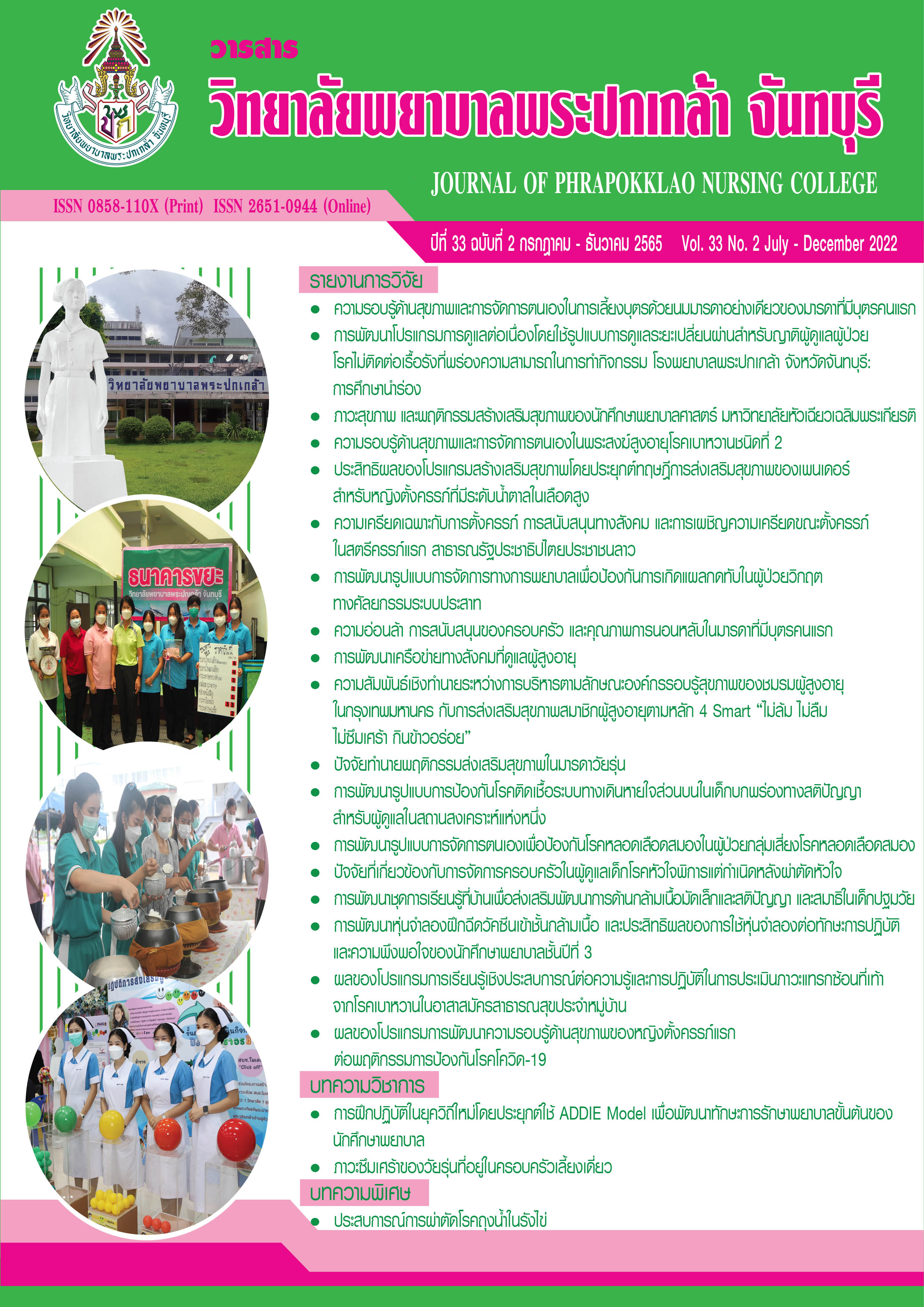Health Literacy and Self-management among Older Monks with Type 2 Diabetes Mellitus
Keywords:
Health literacy, Self-management, Older monks, Type 2 diabetes mellitusAbstract
This descriptive correlational research aimed to examine the relationship between health literacy and self-management among older monks with type 2 diabetes mellitus. The samples consisted of 82 older monks with type 2 diabetes mellitus visiting one Monk Hospital in the Northern, Thailand and four community hospitals in Chiang Mai Province. The research instruments consisted of the demographic data form, the health literacy scale for older monks with type 2 diabetes mellitus with reliability of .83, and the self-management scale for older monks with type 2 diabetes mellitus with reliability of .99. Data were collected from April to June, 2020. Statistics used for data analysis included frequency, percentage, mean, standard deviation, and Pearson’s product moment correlation.
The research results revealed that the total mean scores of health literacy and self-management among older monks with type 2 diabetes mellitus were at a moderate level (M = 40.54, SD = 5.06 and M = 65.91, SD = 4.16, respectively). Health literacy was positively statistically significantly related to self-management among older monks with type 2 diabetes mellitus (r = .483, p < .01).
This research suggests that health care providers should assess health literacy among older monks with type 2 diabetes mellitus as well as promote their self-management focusing on proper exercise and diet consuming.
References
คณิศฉัตร์ วุฒิศักดิ์สกุล. (2561). ปัจจัยที่มีผลต่อพฤติกรรมสุขภาพของพระสงฆ์ในเขตอำเภอฝาง จังหวัดเชียงใหม่. วารสารสมาคมพยาบาลแห่งประเทศไทยฯ สาขาภาคเหนือ, 24(1), 71–83.
จริยา นพเคราะห์, โรจนี จินตนาวัฒน์, และทศพร คำผลศิริ. (2563). ความรอบรู้ด้านสุขภาพและการจัดการตนเองในผู้สูงอายุที่เป็นโรคเบาหวานชนิดที่ 2. พยาบาลสาร, 47(2), 251–261.
ชนัญญา ปัญจพล. (2558). การเตรียมความพร้อมเข้าสู่วัยผู้สูงอายุ: กรณีศึกษาสำนักงานปลัดกระทรวงสาธารณสุข (ส่วนกลาง) (วิทยานิพนธ์ปริญญามหาบัณฑิต). ปทุมธานี: มหาวิทยาลัยธรรมศาสตร์.
เบญจมาศ สุรมิตรไมตรี. (2556). การศึกษาความฉลาดทางสุขภาพ (Health Literacy) และสถานการณ์การดำเนินงานสร้างเสริมความฉลาดทางสุขภาพของคนไทย เพื่อรองรับการเข้าสู่ประชาคมอาเซียน. สืบค้นจาก http://www.mfa.go.th/dvifa/contents/filemanager/files/nbt/nbt5/IS/IS5073.pdf
พระมหาสาทร ธมฺมาทโร, พระมหาวีรธิษณ์ วรินฺโท, กฤติยา ถ้ำทอง, พระมหาศุภวัฒน์ ฐานวุฑฺโฒ, และพระมหาราเชนทร์ เขมาสโภ. (2562). การอุปัฏฐากภิกษุอาพาธ: บทวิเคราะห์ในมิติพระพุทธศาสนา. วารสารมหาจุฬานาครทรรศน์, 6(10), 4686–4696.
พระราชวรมุนี, พระมงคลวชิรากร, พระมงคลธรรมวิธาน, และวีระศักดิ์ พุทธาศรี. (บ.ก.). (2560). ธรรมนูญสุขภาพพระสงฆ์แห่งชาติ พุทธศักราช 2560. กรุงเทพฯ: โอ.เอส. พริ้นติ้ง เฮ้าส์.
พัชรี อ่างบุญตา, ลินจง โปธิบาล, และณัฐพงศ์ โฆษชุณหนันท์. (2555). ผลของโปรแกรมสนับสนุนการจัดการตนเองต่อพฤติกรรมการจัดการตนเองและระดับฮีโมโกลบินเอวันซีของผู้สูงอายุที่เป็นโรคเบาหวานชนิดที่ 2. พยาบาลสาร, 39(3), 93–104.
โรงพยาบาลสงฆ์ กรมการแพทย์. (2561). เผยพระสงฆ์อาพาธด้วยโรคเบาหวานเพิ่มขึ้น. สืบค้นจาก https://www.hfocus.org/content/2018/05/15876
ลือรัตน์ อนุรัตน์พานิช, ปริญดา พีรธรรมานนท์, มนทยา สุนันทิวัฒน์, ภนิตา สรรพกิจภิญโญ, ภัณฑิลา สุภัทรศักดา, และศรัณย์ กอสนาน. (2561). ความแตกฉานทางสุขภาพของพระภิกษุสูงอายุในโรงพยาบาลสงฆ์. Veridian E-Journal Silpakorn University, 11(1), 2643–2656.
วรรณศิริ นิลเนตร. (2557). ความฉลาดทางสุขภาพของผู้สูงอายุไทยในชมรมผู้สูงอายุในเขตกรุงเทพมหานคร (วิทยานิพนธ์ปริญญาดุษฎีบัณฑิต). กรุงเทพฯ: จุฬาลงกรณ์มหาวิทยาลัย.
วัฒนพล ติ่งซุ่ยกุล บัวแก้ว, วารี กังใจ, และพรชัย จูลเมตต์. (2555). ผลของโปรแกรมส่งเสริมการจัดการด้วยตนเองต่อพฤติกรรมการบริโภคอาหาร และค่าดัชนีมวลกายของพระภิกษุสูงอายุที่มีภาวะอ้วน. วารสารสภาการพยาบาล, 27(1), 92–108.
วินัย ไตรนาทถวัลย์, วิราพรรณ วิโรจน์รัตน์, และดวงรัตน์ วัฒนกิจไกรเลิศ. (2562). ปัจจัยที่มีอิทธิพลต่อความแตกฉานด้านสุขภาพของผู้สูงอายุ. วารสารวิจัยทางวิทยาศาสตร์สุขภาพ, 13(2), 41–51.
สุทธินันท์ แก่นจันทร์. (2562). ความรอบรู้ด้านสุขภาพและการจัดการตนเองในพระสงฆ์สูงอายุโรคความดันโลหิตสูง (วิทยานิพนธ์ปริญญามหาบัณฑิต). มหาวิทยาลัยเชียงใหม่.
อามานี แดมะยุ, ศิริรัตน์ ปานอุทัย, และพนิดา จันทโสภีพันธ์. (2563). ความสัมพันธ์ระหว่างความรอบรู้ด้านสุขภาพและการจัดการตนเองในผู้สูงอายุไทยมุสลิมที่เป็นโรคความดันโลหิตสูง. วารสารสภาการพยาบาล, 35(3), 87–107.
Amarya, S., Singh, K., & Sabharwal, M. (2018). Ageing process and physiological changes. Retrieved from www.researchgate.net/publication/326215802_Ageing_Process_and_Physiological_Changes
Ishikawa, H., Takeuchi, T., & Yano, E. (2008). Measuring functional, communicative, and critical health literacy among diabetic patients. Diabetes Care, 31(5), 874–879. doi:10.2337/dc07-1932
Kanan, P., Piaseu, N., Malathum, P., & Belza, B. (2019). Predictors of diabetes self-management in older adults with poorly controlled type 2 diabetes mellitus. Pacific Rim International Journal of Nursing Research, 23(4), 357–367. Retrieved from https://he02.tci-thaijo.org/index.php/PRIJNR/article/view/158994/150340
Lee, P. G., & Halter, J. B. (2017). The pathophysiology of hyperglycemia in older adults: Clinical considerations. Diabetes Care, 40(4), 444–452. doi:10.2337/dc16–1732
Lorig, K. R., & Holman, H. R. (2003). Self-management education: History, definition, outcome, and mechanisms. Annals of Behavioral Medicine, 26(1), 1–7. doi:10.1207/S15324796ABM2601_01
Nutbeam, D. (2000). Health literacy as a public health goal: A challenge for contemporary health education and communication strategies into the 21st century. Health Promotion International, 15(3), 259–267. doi:10.1093/heapro/15.3.259
Downloads
Published
How to Cite
Issue
Section
License
Copyright (c) 2022 JOURNAL OF PHRAPOKKLAO NURSING COLLEGE

This work is licensed under a Creative Commons Attribution-NonCommercial-NoDerivatives 4.0 International License.
เนื้อความ ข้อมูล และรายการอ้างอิงที่ผู้เขียนใช้ในการเขียนบทความเพื่อลงตีพิมพ์ในวารสารวิทยาลัยพยาบาลพระปกเกล้า จันทบุรี ถือเป็นความคิดเห็นและความรับผิดชอบของผู้เขียน คณะผู้จัดทำวารสารไม่จำเป็นต้องเห็นพ้องด้วยหรือร่วมรับผิดชอบ
บทความที่ได้รับการลงตีพิมพ์ในวารสารวิทยาลัยพยาบาลพระปกเกล้า จันทบุรี ถือเป็นลิขสิทธิ์ของวารสารวิทยาลัยพยาบาลพระปกเกล้า จันทบุรี หากหน่วยงานหรือบุคคลใดต้องการนำส่วนหนึ่งหรือทั้งหมดของบทความไปเผยแพร่ต่อเพื่อวัตถุประสงค์ใด ๆ จะต้องได้รับอนุญาตจากบรรณาธิการวารสารก่อน



